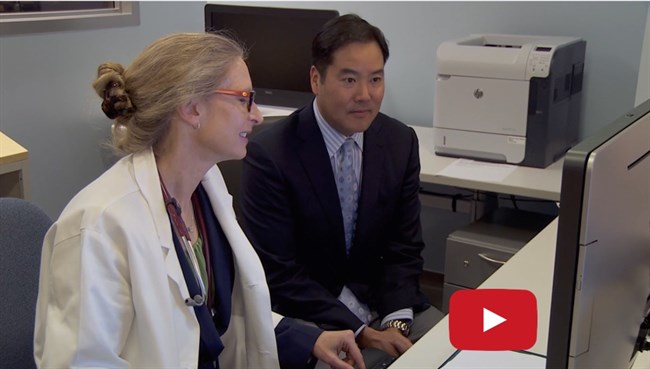
Eric Nakakura, M.D., Ph.D.
- Professor of Surgery
- Division of Surgical Oncology
Contact Information
1600 Divisadero Street
Box 1932 | University of California, San Francisco
San Francisco, CA 94143-1932
Voice (415) 353-9294
Fax (415) 353-9695
[email protected]
Education
- 1986-90 University of California, San Diego B.S. Bioengineering
- 1990-95 Stanford University School of Medicine M.D.
Residencies
- 1995-96 Johns Hopkins Medical Institutions Intern General Surgery
- 1996-03 Johns Hopkins Medical Institutions Resident General Surgery
- 2001 John Radcliffe Hospital, Oxford University General Surgery
Clinical Expertise
- Ampullary Cancer
- Bile Duct Cancer (Cholangiocarcinoma)
- Borderline Resectable Pancreatic Cancer (BRPC)
- Chronic Pancreatitis
- Gallbladder Cancer
- Gastrointestinal Neuroendocrine (Carcinoid) Tumors
- Gastrointestinal Stromal Tumor (GIST)
- Liver Cancer (Hepatocellular Carcinoma)
- Liver Cysts
- Liver Metastases
- Pancreatic Cancer
- Pancreatic Neuroendocrine (Islet Cell) Tumors
- Pancreatic Pseudocysts
- Retroperitoneal Neoplasms
- Small Intestine Cancer
- Soft Tissue Sarcoma
- Stomach (Gastric) Cancer
- Whipple Procedure (Pancreaticoduodenectomy)
Research Interests
- Concurrent EGFR and mTOR blockade in patients with pancreatic neuroendocrine tumors
- Early detection of neuroendocrine tumors
- Neuroendocrine (NE) tumors of the gastrointestinal (GI) Tract
- Targeted therapy for treatment of neuroendocrine tumors
- The role of proendocrine transcription factors and signaling pathways in normal and neoplastic gut
- Translational studies of cancers of the pancreas and gastrointestinal tract
Biography
Dr. Eric Nakakura is a gastrointestinal cancer surgeon who specializes in tumors of the pancreas, bile ducts, liver, and GI tract. He also treats soft tissue sarcomas, including tumors of the retroperitoneum, trunk and extremities. Dr. Nakakura is a leading authority on neuroendocrine carcinoid tumors of the gastrointestinal tract and pancreas. In 2017, he was awarded a $1.2m grant from the Neuroendocrine Tumor Research Foundation (NETRF) to elucidate the causes of small intestinal neuroendocrine tumors (SI-NETs).
Dr. Nakakura earned a medical degree at Stanford Medical School and a doctorate degree in cellular and molecular medicine at the Johns Hopkins University. He completed a residency in general surgery at the Johns Hopkins Medical Institutions and was a specialist registrar in surgery at the John Radcliffe Hospital in Oxford, England. He also completed a fellowship in surgical oncology at the Johns Hopkins Medical Institutions.
Research Overview
Neuroendocrine tumors (NETs) of the small intestine and pancreas frequently spread throughout the body (i.e., metastasize). Surgery is often not possible for patients with advanced disease, and current therapies are ineffective for shrinking tumors and durable palliation of debilitating symptoms, often caused by the release of hormones into the blood. Dr. Nakakura and his colleagues' long-term goal is to find the causes of NETs of the small intestine and pancreas, which can lead to earlier diagnosis and ultimately a cure.
How And Why Neuroendocrine Tumors Develop
In collaboration with Matthew Meyerson (Broad Institute, Dana-Farber Cancer Institute) and Chrissie Thirwell ( University College London Cancer Institute), Dr. Nakakura is studying the causes of small intestine neuroendocrine tumors utilizing state-of-the art genetic and epigenetic technologies of primary tumors and single cell analyses of precursor lesions.
Funding: Neuroendocrine Tumor Research Foundation (NETRF) Accelerator Grant
Novel Neuroendocrine Tumor Models
A particular interest and focus of Dr. Nakakura's translational research is the development of novel neuroendocrine tumor models. His laboratory successfully developed a patient-derived pancreatic neuroendocrine tumor (PNETs) xenograft model--the onlysuch model in the world--that faithfully retains the pathologic and genetic aberrations typical of human PNETs. Dr. Nakakura's laboratory is collaborating with investigators worldwide, studying mechanisms of resistance to current therapies, novel small molecule targeted therapies, CAR T cell therapy, peptide receptor radionucleotide therapy, and the unfolded protein response.
Funding: Neuroendocrine Tumor Research Foundation (NETRF), American Association for Cancer Research (AACR)
Identification of Regulators of NET growth and Hormone Production
Dr. Nakakura's laboratory has a long-term interest to elucidate the transcriptional and signaling events critical to the pathogenesis of NETs of the small intestine and pancreas, which can identify novel targets for diagnosis and treatment. His approach has been to turn to developmental biology for clues. Dr. Nakakura and collegues have found that the same transcription factors (Ascl1, Nkx2.2, Fev, Scratch)1-4 and signaling pathways (Notch)2 that function in the normal development of endocrine cells throughout the body also act to regulate NET hormone production and growth, as well as metastasis. These findings that conserved pathways of neuroendocrine differentiation function in cancer have also shed important insight into normal gut endocrine cell development.
1 Nakakura EK, Watkins DN, Schuebel KE, Sriuranpong V, Borges MW, Nelkin BD, Ball DW. Mammalian Scratch: a neural-specific Snail family transcriptional repressor. Proc Natl Acad Sci U S A, Mar/27/2001;98(7):4010-5. PMID: 11274425
2 Nakakura EK, Sriuranpong VR, Kunnimalaiyaan M, Hsiao EC, Schuebel KE, Borges MW, Jin N, Collins BJ, Nelkin BD, Chen H, Ball DW. Regulation of neuroendocrine differentiation in gastrointestinal carcinoid tumor cells by Notch signaling. J Clin Endocrinol Metab, Jul/2005;90(7):4350-6. PMID: 15870121
3 Wang YC, Gallego-Arteche E, Iezza G, Yuan X, Matli MR, Choo SP, Zuraek MB, Gogia R, Lynn FC, German MS, Bergsland EK, Donner DB, Warren RS, Nakakura EK. Homeodomain transcription factor NKX2.2 functions in immature cells to control enteroendocrine differentiation and is expressed in gastrointestinal neuroendocrine tumors. Endocr Relat Cancer, Mar/2009;16(1):267-79. PMID: 18987169
4 Wang YC, Zuraek MB, Kosaka Y, Ota Y, German MS, Deneris ES, Bergsland EK, Donner DB, Warren RS, Nakakura EK. The ETS oncogene family transcription factor FEV identifies serotonin-producing cells in normal and neoplastic small intestine. Endocr Relat Cancer, 2010;17(1):283-91. PMID: 20048018
Neuroendocrine Tumors of Unknown Primary
Dr. Nakakura and colleagues have found a straightforward solution to a challenging issue for patients with NETs. Often patients are diagnosed with a NET; however, the primary site remains elusive. Based on the small size, submucosal location, and outward growth pattern of ileum NETs, they hypothesized that most patients with NET of unknown primary tumor have an ileal primary tumor.1 Indeed, despite a negative preoperative evaluation, surgical exploration identifies an ileal primary tumor in most cases.1-3 Their studies show that the routine use of many other tests, such as capsule endoscopy, enteroclysis, double-balloon enteroscopy, and endoscopic ultrasonography, is unnecessary because they will not affect patient care and will only delay treatment.
1 Wang SC, Parekh JR, Zuraek MB, Venook AP, Bergsland EK, Warren RS, Nakakura EK. Identification of unknown primary tumors in patients with neuroendocrine liver metastases. Arch Surg. 2010 Mar; 145(3):276-80. PMID: 20231629
2 Wang SC, Fidelman N, Nakakura EK. Management of well-differentiated gastrointestinal neuroendocrine tumors metastatic to the liver. Seminars in Oncology. 2013 Feb; 40(1):69-74. PMID 23391114
3 Bergsland EK, Nakakura EK. Neuroendocrine tumors of unknown primary: Is the primary site really not known? JAMA Surg. 2014 Sep; 149(9):889-90. PMID: 25029597
Predictors of Lymph Node Metastases in Pancreatic Neuroendocrine Tumors
The significance of lymph node metastases in PNETs is controversial. Consequently, the role and extent of lymph node sampling in PNETs is not standardized. Therefore, there is no consensus regarding the optimal surgical approach for PNETs. Surgical options include pancreas-preserving procedures (enucleation, central pancreatectomy) versus standard resections (pancreaticoduodenectomy, distal pancreatectomy).
Dr. Nakakura and colleagues hypothesized that the conflicting prognostic value of PNET lymph node metastasis might be due to inadequate evaluations of lymph nodes and difficulties predicting metastasis. They found that lymph nodes are not evaluated in many major pancreatic resections for PNET and preoperative prediction of nodal metastasis is difficult.1 Their findings suggest that enucleation of PNETs should be reserved for small insulinomas. For other PNETs, surgeons should routinely sample lymph nodes, working closely with pathologists to maximize the number of lymph nodes identified in each specimen. As a result of their study and that of others, the most recent NCCN guidelines for the management of PNETs have incorporated our recommendations and have affected patient management.2
1 Parekh JR, Wang SC, Bergsland EK, Venook AP, Warren RS, Kim GE, Nakakura EK. Lymph Node Sampling Rates and Predictors of Nodal Metastasis in Pancreatic Neuroendocrine Tumor Resections: The UCSF Experience With 149 Patients. Pancreas. 2012 Aug; 41(6):840-4. PMID: 22781907
2 http://www.nccn.org/professionals/physician_gls/pdf/neuroendocrine.pdf (login/password required)
Publications
MOST RECENT PUBLICATIONS FROM A TOTAL OF 93
- Ashraf Ganjouei A, Romero-Hernandez F, Wang JJ, Casey M, Frye W, Hoffman D, Hirose K, Nakakura E, Corvera C, Maker AV, Kirkwood KS, Alseidi A, Adam MA. ASO Visual Abstract: A Machine-Learning Approach to Predict Postoperative Pancreatic Fistula after Pancreaticoduodenectomy Using only Preoperatively Known Data. Ann Surg Oncol. 2023 Nov; 30(12):7776-7777. View in PubMed
- Ashraf Ganjouei A, Romero-Hernandez F, Wang JJ, Casey M, Frye W, Hoffman D, Hirose K, Nakakura E, Corvera C, Maker AV, Kirkwood KS, Alseidi A, Adam MA. A Machine Learning Approach to Predict Postoperative Pancreatic Fistula After Pancreaticoduodenectomy Using Only Preoperatively Known Data. Ann Surg Oncol. 2023 Nov; 30(12):7738-7747. View in PubMed
- Calthorpe L, Romero-Hernandez F, Casey M, Nunez M, Conroy PC, Hirose K, Kim A, Kirkwood K, Maker AV, Corvera C, Nakakura E, Alseidi A, Adam MA. ASO Visual Abstract: National Practice Patterns in Malignant Peritoneal Mesothelioma-Updates in Management and Survival. Ann Surg Oncol. 2023 Aug; 30(8):5131. View in PubMed
- Kasai Y, Nakakura EK, Yogo A, Nagai K, Masui T, Hatano E. Residual Tumor Volume, Not Percent Cytoreduction, Matters for Surgery of Neuroendocrine Liver Metastasis. Ann Surg Oncol. 2023 09; 30(9):5457-5458. View in PubMed
- Chiorean EG, Chiaro MD, Tempero MA, Malafa MP, Benson AB, Cardin DB, Christensen JA, Chung V, Czito B, Dillhoff M, Donahue TR, Dotan E, Fountzilas C, Glazer ES, Hardacre J, Hawkins WG, Klute K, Ko AH, Kunstman JW, LoConte N, Lowy AM, Masood A, Moravek C, Nakakura EK, Narang AK, Nardo L, Obando J, Polanco PM, Reddy S, Reyngold M, Scaife C, Shen J, Truty MJ, Vollmer C, Wolff RA, Wolpin BM, Rn BM, Lubin S, Darlow SD. Ampullary Adenocarcinoma, Version 1.2023, NCCN Clinical Practice Guidelines in Oncology. J Natl Compr Canc Netw. 2023 07; 21(7):753-782. View in PubMed
- View All Publications
In the News
Eric Nakakura and Research Group Awarded $1.2M Grant to Study Small Intestinal Neuroendocrine Tumors
UCSF Surgical Oncology Program - Richard Barg - June 03, 2017Eric Nakakura, M.D., Ph.D., Associate Professor of Surgery at UCSF and a leading authority on neuroendocrine tumors of the gastrointestinal tract and pancreas, is among a team of researchers awarded $1.2M grant by the Neuroendocrine Tumor Research Foundation (NETRF) to elucidate the causes of small intestinal neuroendocrine tumors (SI-NETs). Dr. Nakakura said the research would help to unlock the mysteries of the disease and lead to more effective potentially curative treatments: "This project [...]
- UCSF Surgical Oncology Program - Richard Barg - January 03, 2017Eric Nakakura, M.D., Ph.D., a UCSF gastrointestinal cancer surgeon and Emily Bergsland, M.D.. a UCSF gastrointestinal oncologist, recently discussed the treatment of carcinoid syndrome on "Healthy Body, Healthy Mind", a series hosted by Information Television Network (ITV), a PBS content affiliate. Dr. Nakakura is an Associate Professor in the UCSF Department of Surgery and Dr. Bergsland a Professor in the UCSF Department of Medicine. The ITV episode, which portrays the struggles of Ray Martz [...]

- UCSF Surgical Oncology Program - Richard Barg - September 10, 2016While researchers race to find improved medical therapies for pancreatic ductal adenocarcinoma (PDAC), surgery remains the most effective treatment. Unfortunately, a large percentage of PDAC patients are not surgical candidates because by the time of diagnosis, the disease has metastasized. Even among those without metastases, choosing surgery can be tricky if there is too much risk of leaving live tumor behind. Borderline Resectable Pancreatic Cancer (BRPC) Recently, however, cancer [...]

- UCSF Thoracic Oncology Program - Richard Barg - July 28, 2016While traditionally, standard treatment has consisted of surgery and radiation, sarcoma programs at higher volume centers of excellence such as UCSF, have found, with accumulated experience, that adding chemotherapy to surgery and radiation can be quite effective. Experienced Team of Specialists At UCSF Medical Center, sarcoma patients are treated by a highly experienced multidisciplinary team that includes orthopedic and general surgeons; medical and radiation oncologists; pathologists, [...]

- UCSF Surgical Oncology Program - December 13, 2012Eric Nakakura, M.D., Ph.D. has been awarded the 2012 Caring for Carcinoid Foundation-AACR Grant for Carcinoid Tumor and Pancreatic Neuroendocrine Tumor Research. Dr. Nakakura will receive $250,000 over two years to understand why some patients develop resistance to mTOR inhibiting drugs like everolimus. In particular, he will focus on INK128, a new mTOR inhibitor to see if it can overcome this resistance in mouse models of pancreatic neuroendocrine cancer. He will also evaluate the utility of [...]

- UCSF Surgical Oncology Program - December 08, 2010Then post-graduate student Eric Nakakura, M.D., Ph.D., working in the lab of Johns' Hopkins cancer biologist Barry Nelkin, was struck by how the migration of neurological cells to form the developing brain bore an uncanny similarly to the inexorable migration of invasive cells to distant sites in cancer metastasis. Today, the insight of Dr. Nakakura, now an Assistant Professor in Division of General Surgery and Surgical Oncology Program, forged with postdoctoral fellow Chris Strock, has led [...]

- UCSF Surgical Oncology Program - September 16, 2009UCSF researchers, led by Doug Hanahan, Ph.D., have identified collections of tiny molecules known as microRNAs that affect distinct processes critical for cancer progression. The findings help elucidate the important regulatory function of microRNAs in tumor biology. Eric Nakakura, M.D., Ph.D. (pictured), a surgeon-scientist who treats patients with challenging pancreatic neuroendocrine tumors, was on the team that validated the findings, which were based on an exquisite mouse model [...]

- UCSF Surgical Oncology Program - July 15, 2009For now, the only possible route to outliving pancreas cancer is complete removal of the tumor via surgery. Surgery for pancreas cancer is long and demanding, and surgeons must be practiced to consistently perform it well. Pancreas cancer surgery outcomes are better at high-volume, major medical centers such as UCSF, where surgeons can specialize - perfecting and maintaining skills and deepening their experience and judgment. UCSF surgeons Kimberly Kirkwood, M.D., and Eric Nakakura, M.D., [...]

